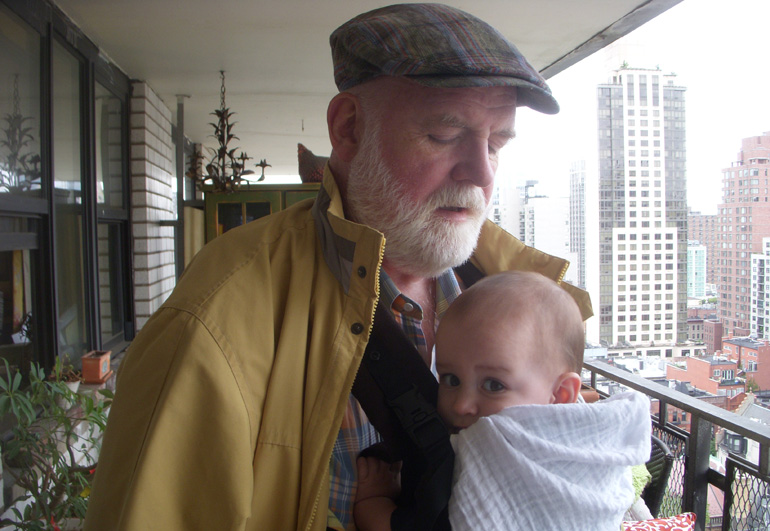Daily Office:
Thursday, 26 August 2010
¶ GOP panjandrum Kenneth Mehlman has come out as a gay man. (Atlantic)
Mehlman’s leadership positions in the GOP came at a time when the party was stepping up its anti-gay activities — such as the distribution in West Virginia in 2006 of literature linking homosexuality to atheism, or the less-than-subtle, coded language in the party’s platform (“Attempts to redefine marriage in a single state or city could have serious consequences throughout the country…”). Mehlman said at the time that he could not, as an individual Republican, go against the party consensus. He was aware that Karl Rove, President Bush’s chief strategic adviser, had been working with Republicans to make sure that anti-gay initiatives and referenda would appear on November ballots in 2004 and 2006 to help Republicans.
Mehlman acknowledges that if he had publicly declared his sexuality sooner, he might have played a role in keeping the party from pushing an anti-gay agenda.
We disagree. We believe that an earlier self-outing would have been self-defeating, in the sense that Mr Mehlman would have put an end to his career as a Republican Party operative. We like to think that this announcement is opportunistic — in the sense that it’s opportune, signalling a marginalizing shift in the role of homophobia in American politics. We do, however, share Joe’s exasperation.
¶ It’s a commonplace — at least among serious readers — that even the greatest novels change over time: the Emma that you read at sixteen is not the Emma that you’ll read at forty, even though not a single word in Jane Austen’s text has been changed. We do the changing. At The Online Photographer, Michael Johnston reports on an interesting variant of that phenomenon: you can never really go back to using equipment that you used to rely on every day.
Then it occurred to me…that always happens when I try to replace a favorite camera or lens from the past. I’ve done it at least six or eight times…tried to re-purchase a favorite camera that I let go at one time, but still miss. I sold my Leica M6 in 1993 and tried to buy another one in 1999—the lens design had changed, and the newer camera didn’t have the same feel. Wish I had just kept the first one. One of the best lenses I ever used was a Schneider lens on a funky old Practisix update called an Exakta 66. I got rid of that camera because of some anomalies that were purely user error, I’m embarrassed to admit. This gets worse: when I tried to replace it with another one, the brand-new camera came straight from the box with its focusing screen installed upside-down. Who knew? All I knew was that it didn’t focus right. I sold it. Only later did I find out about the upside-down screens. I even had a guy send me a beat-up old Spotmatic once so I could try the lens. I loved it. Did a lot of good work with it. Would you know, I never found another Spotmatic body that I liked as well as that first one. Go figure.
In fact, I think that every attempt I have ever made to re-purchase or re-acquire a fondly-remembered camera from my past has ended in failure or disappointment somehow.
¶ So, it has come to this, the current debate about unemployment: “Strucs vs Cycs.” Will “business cycles” restore jobs? Or is there a mismatch between jobs and workers that the market will not solve (in anyone’s lifetime, that is)? We agree (as usual) with Felix Salmon’s refinement on the structuralist position.
I also think it makes sense to break the Struc argument down into its component parts: the inability of the unemployed to find work, on the one hand, and the inability of employers to find good employees, on the other. The first part seems to be undeniable, and it’s surely getting worse as the length of time that people have been looking for work rises inexorably. The longer you’ve been without a job, the harder it becomes to get one, until you become unemployable.
Meanwhile, just because it’s hard to find good employees doesn’t mean that your business is booming and that there are lots of incentives for the unemployed to join your industry. The Cycs could well have a point here — if we get an uptick in total demand, then that might help increase employment in the parts of the economy with tight labor markets. But for the time being, employers who can’t find the employees they want seem to be resigned to simply keeping on going with the employees they’ve got: dreams of expansion have given way to grim survival and a refusal to take on extra debt or risk. And they certainly don’t want to risk raising their prices in this economy, even if they suspect they could get away with doing so.
¶ Jonah Lehrer writes about the crash in housing prices in terms of the cognitive bias known as “loss aversion.” Clearly, what’s needed is a positive rhetoric for freeing homeowners from albatross properties.
Classical economics assumes that people will adjust to the new reality. They’ll realize that the market has changed, and that they made a costly mistake. But that’s not what happened. In their paper, “Loss Aversion and Seller Behavior: Evidence From the Housing Market,†Mayer and Genesove found that, for essentially identical condos, people who had bought at the peak of the market (between 1989-1992) listed their properties for nearly 35 percent more than those who had bought after the collapse. Why? Because they couldn’t bear to take a loss.
The end result, of course, is that these overpriced properties just sat there, piling up like unwanted inventory. According to the economists, less than 25 percent of the properties bought during the condo bubble sold in less than 180 days.
¶ 4chan, a site that the Guardian calls “the id of the Internet,” is about to be transformed, via initial public offering, into Canvas. Julian Dibbell writes about Christopher Poole’s venture at MIT Technology Review. (via kottke.org)
It says something that investors in Canvas–who include Marc Andreessen (creator of the first graphical Web browser) and Ron Conway (an early Google backer)–would bet on a track record like Poole’s. For all of 4chan’s eye-popping traffic stats, it’s doomed to bare-subsistence revenue by the combination of its scandalous content (palatable only to low-rent advertisers like porn sites) and Poole’s profound discomfort with, as he puts it, the “tons of ways I could essentially rape the site for dollars” (including pop-ups, ads with sound, and other high-paying but obnoxious forms of advertising that would antagonize 4chan’s community). And whether it was the 2006 “dirty bomb” incident, in which 20-year-old Jake Brahm flooded /b/ with threats to detonate radioactive explosives at NFL games, or the harrowing of Jessi Slaughter this July, in which the troll hordes of /b/ rained death threats and other anonymous harassment on an 11-year-old Florida girl, the portrayal of 4chan in the national news has mainly reflected the image of a menace to be contained rather than an enterprise to watch.
And yet, many in the Internet business have been watching 4chan with interest. The steady growth of its traffic and the viral spread of its content, after all, represent the kind of social success that Web businesses require. “Getting engaged users is the tough part,” says David Lee, who invested in Canvas as a partner in Conway’s SV Angel firm. Profit or no profit, he explains, 4chan shows that Poole “is the rare entrepreneur who can get engaged users.” And given how firmly anonymity is held to be a recipe for social-media failure, it’s intriguing that the site works at all. 4chan “was a thing that challenged people’s assumptions in the Web industry,” says Jonah Peretti, CEO of the viral-media startup BuzzFeed and cofounder of the Huffington Post. “It was just so different from the way other people were thinking about community.”
¶ Tyler Cowen on Eliza Griswold’s The Tenth Parallel: “This is the book which everyone is reading…” Our copy is on order!
This is the book which everyone is reading, and reviewing, right now. It has good coverage of Nigeria, Somalia, Sudan, Indonesia, Malaysia, and the Philippines, and the clash between religions in those areas. I can definitely recommend it. My major complaint has to do with framing. The author reminds us that “the main fault lines are within Islam,” or something like that, etc., yet if you read only this book, or for that matter its subtitle, you would come away with a different impression altogether. The very premise of the book selects for clash among the two major religions surveyed and I don’t think the author quite comes to terms with this fact. She is torn by conflicting impulses to pursue her initial premise to its logical conclusion, and yet also to provide a more politically correct account than what she sees in front of her eyes.
¶ Richard Greenwald writes perceptively about the quest for authenticity in today’s urban writing, which, although he doesn’t mention them, clearly betray “out-of-towner” anxieties. The work of Jonathan Lethem is a perfect foil for this discussion, because the writer grew up in a gentrifying household: Is he really Dean Street?
New York City has witnessed rapid swings in fortunes during Lethem’s own lifetime that we are still trying to comprehend. The urban unrest of the 1960s sped up white middle-class flight, so that by the 1980s many cities saw increasing concentrations of poverty and people of color. With lower tax bases, services were cut and a cycle of decline seemed set. Cities like New York City seemed doomed. The summer of 1977 was the nadir for New York City. A time I know Lethem remembers, as do I. 1977 was the summer of the Son of Sam (the serial killer), a blackout with massive looting and lawlessness, and what has been termed “the burning of the South Bronx†as arson destroyed dozens of square blocks of the borough, and the bankruptcy of the city itself. But as thousands left, many stayed and “discovered†new neighborhoods that made them feel real rather than artificial (urban rather than suburban). Moreover, this first wave of counter-culture gentrifiers, on the Lower East Side, SoHo, or Lethem’s own parents in Brooklyn, committed themselves to an urban utopia where race and class disappeared in their minds as divisions (though we know it couldn’t ever disappear). These older artists and activists made a political and creative choice to stay in the city, to stand with it and therefore, the city’s culture became theirs and defined them. But this generation also made it easier some years later for others to join them, who were less idealistic, as they were ironically also the leading edge of gentrification.
¶ One of the Editor’s most electric memories is the look on his adoptive mother’s face when he announced, at the age of ten or so, that he was going to change his name when he grew up — anything but the name that he’d been given would be better.Â
In those days, the routine, common among immigrants, of changing names, especially from foreign, difficult ones into tony English ones, was just beginning to fade. Now, Sam Roberts reminds us in the Times, it has become quite unusual.
The New York Times examined the more than 500 applications for name changes in June at the Civil Court in New York, which has a greater foreign-born population than any other city in the United States. Only a half dozen or so of those applications appeared to be obviously intended to Anglicize or abbreviate the surnames that immigrants or their families arrived with from Latin America or Asia. (A few Russians and Eastern Europeans did, but about as many embraced their family’s original surnames as adopted new ones.)
The vast majority of people with clearly ethnic surnames who applied to change them did so as a result of marriage (belatedly adopting a spouse’s surname or creating a new hyphenated one) or childbirth (because they were legally identified when they were born only as a male or female child or were adopting a parent’s name).
Iyata Ishimabet Maini Valdene Archibald of Brooklyn changed her name to Ishimabet Makini Valdene Bryce. Guo Wi Chan of Forest Hills, Queens, changed his to Ryan Guowei Chan. And after Jing Qiu Wu, the Flushing, Queens, mother of 5-year-old Star Jing Garcia, divorced, she renamed her daughter Star Rain Wu, dropping her husband’s surname.
¶ A project that perfectly captures the mentality of Ayn Rand’s fans. (Brainiac)










